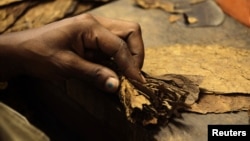SEOUL —
Anti-smoking groups are hailing a new international treaty to combat the illicit tobacco trade. Representatives of governments and international organizations Monday, meeting in South Korea, unanimously approved the protocol. The action came on the first day of a meeting of the World Health Organization's Framework Convention on Tobacco Control (FCTC).
The protocol creates a new global system requiring non-removable tracking codes on each pack of cigarettes. That is meant to make it easier to trace producers and distributors of counterfeit tobacco products.
Speaking at the FCTC's opening session, the World Health Organization director-general Margaret Chan, urged adoption of what she terms a game-changing treaty.
“The protocol gives the world an orderly, rules-based instrument for countering and eventually eliminating a very sophisticated international criminal activity,” Chan explained.
The WHO estimates one in 10 cigarettes purchased are coming through illegal channels, costing governments more than $40 billion annually in lost taxes.
Cigarette giant Philip Morris International issued a statement hailing the action but saying it is not a "silver bullet for resolving this serious issue."
"Preventive measures not covered under today's agreement, such as regulating the essential materials used to produce tobacco products, should be considered by governments in the national implementation of this protocol," said vice president of communications, Peter Nixon, in the statement released in Lausanne, Switzerland.
The company, which has seven of the world's top 15 international brands, noted that black market tobacco products combined compose the world's third largest tobacco supplier.
The International Tax and Development Center in Washington says the counterfeit cigarette industry funds international criminal organizations and terrorists.
The action approved Monday by more than 170 countries marks a turning point for the FCTC which, until now, has focused on curbing demand rather than involvement with the supply chain.
John Stewart, who directs anti-tobacco efforts at the U.S.-based Corporate Accountability International, says the protocol will help curb smoking.
“This is a huge victory for public health," Stewart said. "Illicit trade in tobacco floods markets with cheap unregulated tobacco products which make them more widely available to children and the poor.”
To be implemented the treaty will need ratification from more than 40 countries.
Francis Thompson, a director at the Geneva-based Framework Convention Alliance, says that will take years.
“It is a protocol that will be relatively complicated to implement because it involves multiple different government agencies and ministries. So we won't know for sure how well it works for five or 10 years,” Thompson said.
The conference, which runs through Saturday, is also to discuss guidelines on prices and taxes to reduce the demand for tobacco, and look at regulations for smokeless products such as electronic cigarettes.
The protocol creates a new global system requiring non-removable tracking codes on each pack of cigarettes. That is meant to make it easier to trace producers and distributors of counterfeit tobacco products.
Speaking at the FCTC's opening session, the World Health Organization director-general Margaret Chan, urged adoption of what she terms a game-changing treaty.
“The protocol gives the world an orderly, rules-based instrument for countering and eventually eliminating a very sophisticated international criminal activity,” Chan explained.
The WHO estimates one in 10 cigarettes purchased are coming through illegal channels, costing governments more than $40 billion annually in lost taxes.
Cigarette giant Philip Morris International issued a statement hailing the action but saying it is not a "silver bullet for resolving this serious issue."
"Preventive measures not covered under today's agreement, such as regulating the essential materials used to produce tobacco products, should be considered by governments in the national implementation of this protocol," said vice president of communications, Peter Nixon, in the statement released in Lausanne, Switzerland.
The company, which has seven of the world's top 15 international brands, noted that black market tobacco products combined compose the world's third largest tobacco supplier.
The International Tax and Development Center in Washington says the counterfeit cigarette industry funds international criminal organizations and terrorists.
The action approved Monday by more than 170 countries marks a turning point for the FCTC which, until now, has focused on curbing demand rather than involvement with the supply chain.
John Stewart, who directs anti-tobacco efforts at the U.S.-based Corporate Accountability International, says the protocol will help curb smoking.
“This is a huge victory for public health," Stewart said. "Illicit trade in tobacco floods markets with cheap unregulated tobacco products which make them more widely available to children and the poor.”
To be implemented the treaty will need ratification from more than 40 countries.
Francis Thompson, a director at the Geneva-based Framework Convention Alliance, says that will take years.
“It is a protocol that will be relatively complicated to implement because it involves multiple different government agencies and ministries. So we won't know for sure how well it works for five or 10 years,” Thompson said.
The conference, which runs through Saturday, is also to discuss guidelines on prices and taxes to reduce the demand for tobacco, and look at regulations for smokeless products such as electronic cigarettes.




